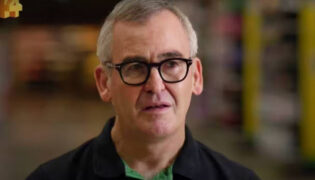[Edition 20] Ethiopia is stuck in a cycle of drought, the former Yugoloslavia has been waging the same war for the past 800 years and there seems no end in sight. Which is why many commentators are turning to an ancient Chinese art to explain why some countries seem to have all the luck.

A young ethiopian |
[Edition 20] Like most geo-political commentators, US-based feng shui master, Rupert Reid has a view on the terrible story of the break-up of the former Yugoslavia. However, unlike conventional historians, who tend to try and isolate political, economic and social factors in instability, Reid thinks the problem is more fundamental than that.
The region, he says, suffers from a clear lack of balance, and its borders are drawn without reference to the presence of auspicious energy flows. In short, its yin and yang are not in balance, there is no place which provides for an outpouring of the necessary negative Chi energy that allows good emotions to be fully expressed. On top of that, the road between Sarejavo and the regional centre, Split, runs at an angle that a strict reading of the I Ching would indicate as sub-optimal. In summary, says Reid, that entire region is one great big “suckmeister, vibewise”. Its feng shui is not good, and experts say that this alone provides a consistent and coherent answer to the question of why peace in the region proves so difficult to secure.
His theory is gaining credibility among geo-political heavyweights, and it is the thinking behind US Secretary of State, Madeleine Albright’s plan for the former Yugoslavia, which would see Serbia down moved to Central Africa until it achieved more balanced energy flows. Reid believes the Albright plan would also help the constant drought and famine in Sub-saharan Africa.
Reid treats with derision the idea that Africa’s problems are caused by Third World debt and a crippling poverty cycle imposed by Western capitalism, which forces countries to export crops for cash, rather than stockpiling grain for the local population. “That’s easy to say, but doesn’t really offer any solutions to the current famine, does it?” says Reid. “If I had my way I would actually move the entire continent of Africa 50 kilometres to the left and rotate its angle of alignment about 5 degrees clockwise. But I think that’s a long way off.” Reid says people are skeptical about feng shui. “I can understand that, I was too at first. But once you start conceptualising the world’s problems as being a sub-optimal I Ching, rather than the geo-political power games, it’s a lot easier to understand and things fit in to place, so to speak.”
‘Feng shui’, the collection of ancient Chinese practices which seek to re-align places, and the activities of people with the energy of the surrounding environment, has long been part of international diplomacy. The analysis of Yugoslavia described above was performed by Reid working as a consultant to the CIA, providing the US intelligence agency with vital analyses of feng shui assets and obstacles to US policy.
Reid, and a growing cadre of international geomancy professionals, are revitalising the ancient Chinese art in two ways. Firstly, they are leading the charge to re-affirm the relevance of conventional feng shui to diplomatic endeavours. This type of intervention was made famous in 1986 when an American diplomat surreptitiously moved Mikhail Gorbachev’s chair during a peace summit in Geneva, a move that some people credit with causing Russia’s defeat in the Cold War. Secondly, there is a revolutionary new field, tentative dubbed “macro feng shui” by observers (or, as Reid likes to shorten it, “Big Shui”).
Big Shui extrapolates from conventional feng shui which is, at its core, related to the placement of buildings within an architectural ensemble in a form of Eastern town planning. Most Western experience of feng shui is to narrow the focus of inquiry to individual rooms within a building, or the placement of items such as furniture within those rooms. Big Shui shifts the scale in the other direction, seeking to understand the energy flows that relate to cities, nations or regions.
Interestingly, one of the most ardent practitioners of Big Shui is the US State Department, where a US$240 million dollar contract has been awarded to The Serene Fellowship Corp, a large global consultancy, to provide not only feng shui analysis, but its more exotic cousins such as geomancy, dowsing, the identification of ley lines. There is also believed to be a trial underway to explore the use of feng shui in military applications – although this must overcome the residual suspicion of the US Navy, a long-term opponent of such initiatives.
The Navy’s attitude is believed to date to its first problem with these “non-conventional intelligence techniques” in Project Lemming, a long-term trial conducted in 1984, involving 10,000 university students testing the use of water divining to find and disable land mines.
Of course, there are skeptics who doubt the rigour and repeatability of such results. In Europe, where feng shui was one of the innovations brought back from China by the fourteenth century explorer, Marco Polo, the practices are regarded as little more than superstitions, unlikely to result in the re-arranging of a major capital city or attempts to produce balanced energy flows through the construction of a canal (such is believed to have been one of the reasons behind the construction of the Panama Canal).
But has Reid and the other international experts got any guidance for Australia from Big Shui? “Absolutely” enthuses Reid. His observations suggest that Australia has a lot to learn about securing properly-functioning energy flows. The danger is not energy inflow – of which our well-positioned entrances (on the eastern and western extremities) provide ample supplies – but energy outflow. Without a balance between inflow and outflow, then the nation acquires too much “stagnant” energy, leading to inauspicious presences in the northern parts of the country. Ultimately, such limited outflows can lead to stultifying lack of progress and a hurtful, backwards-looking nostalgia linked to a lack of ‘true serenity concerning the future’. “I would be expecting one of final signs of energy stagnation to be these traits surfacing in the national leadership”, observed Reid.






